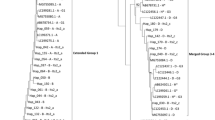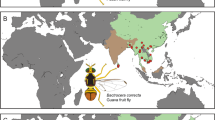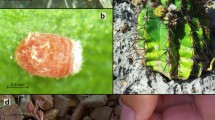Abstract
Sympatric speciation by the formation of host races (parasite populations associated with different plant or animal hosts) has been the subject of great controversy. It has been difficult to demonstrate the existence of host races1,2, much less to prove that host races are evolving toward species status. Genetic polymorphism attributable to association with different resources does occur3, but the phenomenon is far from ubiquitous in parasite populations. The apple maggot fly Rhagoletis pomonella uses a variety of host plants, and Bush4,5 has argued that it is a likely candidate for speciation by a sympatric mode. So far however there has been no direct evidence of any genetic differentiation between host-associated fly populations. We report significant differences in allele frequencies between fly populations reared from sympatric apple (Mains pumila) and hawthorn (Crataegus mollis) trees at a field site in Urbana, Illinois, in the United States.
This is a preview of subscription content, access via your institution
Access options
Subscribe to this journal
Receive 51 print issues and online access
$199.00 per year
only $3.90 per issue
Buy this article
- Purchase on Springer Link
- Instant access to full article PDF
Prices may be subject to local taxes which are calculated during checkout
Similar content being viewed by others
References
Diehl, S. R. & Bush, G. L. A. Rev. Ent. 29, 471–504 (1984).
Futuyma, D. J. & Mayer, G. C. Syst. Zool. 29, 254–271 (1980).
Futuyma, D. J. & Peterson, S. C. A. Rev. Ent. 30, 217–238 (1985).
Bush, G. L. in Genetic Mechanisms of Speciation in Insects (ed. White, M. J. D.) 3–23 (Australian and New Zealand Book Co., 1974).
Bush, G. L. in Evolutionary Strategies of Parasitic Insects and Mites (ed. Price, P. W.) 187–206 (Plenum, New York, 1975).
Feder, J. L., Chilcote, C. A. & Bush, G. L. Nature 336, 61–64 (1988).
McPheron, B. A. thesis, Univ. Illinois (1987).
McPheron, B. A., Smith, D. C. & Berlocher, S. H. Genetics 119, 445–451 (1988).
Slatkin, M. A. Rev. ecol. Syst. 16, 393–430 (1985).
Smith, D. C. Nature 336, 66–67 (1988).
Porter, B. A. U.S.D.A. Tech. Bull. No. 66 1–48 (1928).
Bush, G. L. Bull. Mus. comp. Zool. Harv. 134, 431–562 (1966).
Hedrick, P. W. A. Rev. Ecol. Syst. 17, 535–566 (1986).
Weir, B. S. & Cockerham, C. C. Evolution 38, 1358–1370 (1984).
Berlocher, S. H. J. Hered. 71, 63–67 (1980).
Berlocher, S. H. A. ent. Soc. Amer. 73, 131–137 (1980).
Berlocher, S. H. & Smith, D. C. J. Hered. 74, 337–340 (1983).
Author information
Authors and Affiliations
Rights and permissions
About this article
Cite this article
McPheron, B., Smith, D. & Berlocher, S. Genetic differences between host races of Rhagoletis pomonella. Nature 336, 64–66 (1988). https://doi.org/10.1038/336064a0
Received:
Accepted:
Issue Date:
DOI: https://doi.org/10.1038/336064a0
This article is cited by
-
Identification of Host Fruit Volatiles from Snowberry (Symphoricarpos albus), Attractive to Rhagoletis zephyria Flies from the Western United States
Journal of Chemical Ecology (2017)
-
Fitness benefits of the fruit fly Rhagoletis alternata on a non-native rose host
Oecologia (2016)
-
Mixture and odorant processing in the olfactory systems of insects: a comparative perspective
Journal of Comparative Physiology A (2013)
-
Lack of genetic differentiation after host range extension argues for the generalist nature of Pityogenes chalcographus (Curculionidae: Scolytinae)
Annals of Forest Science (2012)
-
Identification of Host Fruit Volatiles from Three Mayhaw Species (Crataegus Series Aestivales) Attractive to Mayhaw-Origin Rhagoletis pomonella Flies in the Southern United States
Journal of Chemical Ecology (2011)
Comments
By submitting a comment you agree to abide by our Terms and Community Guidelines. If you find something abusive or that does not comply with our terms or guidelines please flag it as inappropriate.



